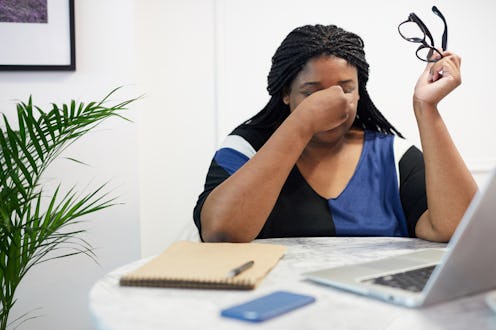
If you live with migraine headaches, you're probably wondering if your migraines change as you get older. More specifically, will they ever get better? I get it. As a lifelong migraineur, I've often wondered if the prevalence of my migraines would lessen over time. The good news is research suggests that the average migraineur should notice a decline in their migraines by age 40.
However, this isn't true for everyone. Dr. Sara Crystal, a neurologist, headache specialist, and medical advisor for online migraine platform Cove, which offers affordable medical consults and prescription migraine medications, tells Bustle that for some women, migraines can spike during their 40s and 50s before dropping off later in life. "Variations in hormone levels throughout a woman’s life have a strong influence on the presence of migraine. Migraine incidence increases at puberty, and more than 50% of women note an association between migraine and menstruation," Dr. Crystal says.
"With regards to menopause, approximately two-thirds of women [who] go through natural (non-surgical) menopause will experience a reduction in their headaches. However, the perimenopausal time leading up to full menopause can be a period of increased headaches," she says. If you're a millennial, menopause is likely decades away. And unfortunately, even if your migraines aren't hormone related, it might get worse before it gets better.
Your lifestyle can also influence your migraines as you age. In Neurology and Clinical Neuroscience, Dr. Stephen D. Silberstein charts migraine activity in women and reports a significant spike in migraine activity in women during their 20s and 30s.
While part of the increase in migraine headaches among women can indeed be attributed to hormones, as Dr. Crystal explains, you might also experience an onslaught of migraines in your 20s and 30s due to stress. And a study published in the journal Headache found that stress as a migraine trigger doesn't decrease until middle age.
This makes sense because young adulthood is the time when you're beginning your career, figuring out who you are, entering serious relationships, and perhaps even starting a family. Dr. Silberstein also noted that people who are financially stable have fewer migraines than those who aren't — likely because they stress less about money and have greater access to treatment options.
Stress is certainly a trigger for me, and my 20s and early 30s were riddled with stress-induced migraine episodes. In fact, stress became such a problem for me that I had to reorganize my life to prioritize my health in order to reduce my migraine frequency, which at its height included eight straight weeks with a migraine every single day.
The good news is that as you get older, you're better able to identify and manage your migraine triggers. I've had migraines since I was 6, but I went through most of my childhood and teen years without making the connection between my triggers — like perfume, fluorescent lighting, and my menstrual cycle — and developing a migraine. Knowing what brings on a migraine for you can go along way toward helping prevent them. Because when it comes to migraines, knowledge is power.
If you experience menstrual migraines, there are steps you can take to reduce them. I take a few supplements that have helped me enormously, and I previously took a birth control pill to reduce the frequency of my menstrual migraines. If you have this type of migraine, talk to your gynecologist and neurologist about which option is best for you. I also always get a migraine when I'm out of my rescue medication, which means I have to make seeing my doctor regularly to stay current on my prescriptions a priority.
If you're in your 20s or 30s and your migraines are at their worst due to stress, consider taking some time to assess your lifestyle. If you're not sure what your migraine triggers are, keep a headache journal so you can chart things you were exposed to, food and drinks you consumed, or stressful situations that occurred immediately prior to the onset of a migraine.
You might discover some things you love on the list, like cured meats or red wine. While it's certainly a bummer to have to avoid some of your favorite things, in the long run more headache-free days are better than a charcuterie plate and a bottle of pinot. If your job is hella stressful, you might think about adopting a meditation practice or fitness routine to reduce the level of stress hormones in your body.
Personally, I've had to accept that there are things I just can't do if I want to stay well. This includes wearing (or being around) perfume, exposing myself to certain kinds of lighting, staying up all night or sleeping too much, excessive travel, skipping my morning coffee, allowing myself to get dehydrated, and eating a lot of processed foods. Basically, having migraines means that in order to stay well, not practicing self-care is not an option. Because migraines suck, and managing them for the next 25 to 30 years shouldn't be any more of a burden than it already is.